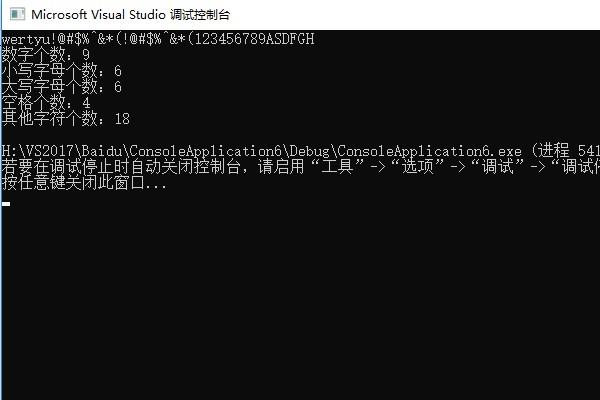用C语言编程:在显示器上输入一段字符串,并统计出现字符的个数和各个字符出现的次数
Posted
tags:
篇首语:本文由小常识网(cha138.com)小编为大家整理,主要介绍了用C语言编程:在显示器上输入一段字符串,并统计出现字符的个数和各个字符出现的次数相关的知识,希望对你有一定的参考价值。
统计字母出现的个数和每个字母出现的次数
#include <stdio.h>void main()
char c;
int i,letters=0,num[26]=0; //字符的个数, 26个字符个数初始化为0
printf("请输入一段字符串:\n");
while((c=getchar())!='\n')
if(c>='a'&&c<='z'||c>='A'&&c<='Z')
letters++;
if(c>='a'&&c<='z') num[c-'a']++;
if(c>='A'&&c<='Z') num[c-'A']++;
printf("字符的个数:%d\n",letters);
printf("每个字符出现的次数:\n");
for(i=0;i<26;i++)
if(num[i]>0)
printf("字符%c:%d次 ",i+'a',num[i]);
参考技术A #include <studio.h>
#include <string.h>
void frequency( string& s, char& A[ ], int& C[ ], int &k )
// s是输入字符串,数组A[ ]中记录字符串中有多少种不同的字符,C[ ]中记录每
//一种字符的出现次数。这两个数组都应在调用程序中定义。k返回不同字符数。
int i, j, len = s.length( );
if ( !len )
ptintf("The string is empty. " );
k = 0;
return;
else
A[0] = s[0]; C[0] = 1; k = 1; /*语句s[ i ]是串的操作*/
for ( i = 1; i < len; i++ ) C[ i ] = 0; /*初始化*/
for ( i = 1; i < len; i++ )
/*检测串中所有字符*/
j = 0;
while ( j < k && A[j] != s[ i] ) j++; /*检查s[ i]是否已在A[ ]中*/
if ( j == k )
A[k] = s[ i]; C[k]++; k++
/*s[ i]从未检测过*/
else C[ j]++; /*s[ i]已经检测过*/
参考技术B #include<stdio.h>
struct Counter
int c;
int flag;
;
void main()
char a[50],b[50];
int i,j,sum;
struct Counter count[50]=0,0;
scanf("%s",a);
for(i=0;a[i]!=0;i++)
b[i]=a[i];
for(i=0;a[i]!=0;i++)
for(j=0;j<=i;j++)
if(a[i]==a[j]&&i!=j)
(count[j].c)++;
(count[j].flag)=1;
break;
else if(a[i]==a[j]&&i==j)
(count[i].c)=1;
(count[i].flag)=1;
sum=i;
printf("共有%d个字符\n",sum);
for(i=0;b[i]!=0;i++)
if(count[i].c!=0&&count[i].flag==1)
printf("%c有%d个\n",b[i],count[i].c);
参考技术C #include <stdio.h>
main()
int c,i,nwhite,nother;
int ndigit[10];
nwhite=nother=0;
for (i=0;i <10;++i)
ndigit[i]=0;
while ((c=getchar())!=EOF)
if (c> = '0 '&&c <= '9 ')
++ndigit[c- '0 '];
else if (c== ' '||c== '\n '||c== '\t ')
++nwhite;
else
++nother;
printf( "digit= ");
for (i=0;i <10;++i)
printf( "%d ",ndigit[i]);
printf( ".white space=%d,other=%d\n ",nwhite,nother);
追问
你那能调试出来不呀
追答能
追问能不能弄个简单易懂的呀?
追答#include
void count(char *s, int *digit, int *letter, int *other)
int i;
for(i=0;s[i]!='\0';i++)
if(s[i]>='a'&&s[i]='A'&&s[i]'0'&&s[i]<'9')
(*digit)++;
else
(*other)++;
void main()
int x=0,y=0,z=0;
char ch[80];
printf("Enter a string:");
gets(ch);
count(ch,&x,&y,&z);
printf("数字有:%d个,字母有:%d个,其它符号有:%d个\n",x,y,z);
这个够简单了吧
用C语言编写一个程序,输入一个字符串,统计其中各个字符出现的次数
利用数组编写
源程序代码如下:
#include "pch.h"
#define _CRT_SECURE_NO_WARNINGS//VS环境下需要,VC不需要
#include<stdio.h>
int main()
char c = 0;//定义输入字符变量
int num_count = 0;//数字个数
int bigalp_count = 0;//大写字母个数
int littlealp_count = 0;//小写字母个数
int emp_count = 0;//空格个数
int els_count = 0;//其他字符个数
while((c = getchar()) != '\\n')//连续输入字符直到输入回车结束
if((c >= '0')&&(c <= '9'))//判断是否是数字
num_count ++ ;
else if ((c >= 'a') && (c <= 'z'))//判断是否是小写字母
littlealp_count++;
else if ((c >= 'A') && (c <= 'Z'))//判断是否是大写字母
bigalp_count++;
else if(c == ' ')//判断是否是空格
emp_count ++;
else //判断是否其他字符
els_count ++;
//输出个数统计值
printf("数字个数:%d\\n小写字母个数:%d\\n大写字母个数:%d\\n",num_count, littlealp_count, bigalp_count);
printf("空格个数:%d\\n其他字符个数:%d\\n", emp_count, els_count);
return 0;
程序运行结果如下:

扩展资料:
其他实现方法:
#include <stdio.h>
#include <ctype.h> //对空白字符的判断,调用了isspace()函数,所以要调用头文件
int main()
char str[20]; //这块对输入有所限制了
int num_count=0;
int space_count=0;
int other_count=0;
char *p=str;
gets(str); //接收字符串
while(*p)
num_count++;
else if(isspace(*p)) //用isspace函数来判断是不是空白字符
space_count++;
else
other_count++;
p++;
printf("num_count=%d\\n",num_count);
printf("space_count=%d\\n",space_count);
printf("other_count=%d\\n",other_count);
return 0;
#include<stdio.h>
int main(void)
char ch;
int a=0,b=0,c=0,d=0;
while((ch=getchar())!='\n')
if(ch>='A'&&ch<='Z'||ch>='a'&&ch<='z')
a++;
else if(ch>='0'&&ch<='9')
b++;
else if(ch==' ')
c++;
else
d++;
printf("字母=%d\n数字=%d\n空格=%d\n其他字符=%d\n",a,b,c,d);
return 0;
追问
你遍的我没学过唉,能用数组遍吗
追答大哥,这还在数组前面呢,你仔细看看,其实就是个简单的while循环,比for都简单呢,如果你数组会的话,这个很好懂的。
本回答被提问者和网友采纳 参考技术B #include <vector>#include <iostream>#include <string>
#include <MAP>
using namespace std;
int main()
map<char,int> m_Count;
string str;
cout<<"请输入字符串!!"<<endl;
cin>>str;
for (size_t i = 0;i < str.size();++i)
m_Count[str[i]]++;
map<char,int>::iterator iter;
for (iter = m_Count.begin(); iter != m_Count.end();++iter)
cout<<iter->first<<":"<<iter->second<<endl;
return 0;
追问
你编的我没学过能用数组编吗
以上是关于用C语言编程:在显示器上输入一段字符串,并统计出现字符的个数和各个字符出现的次数的主要内容,如果未能解决你的问题,请参考以下文章